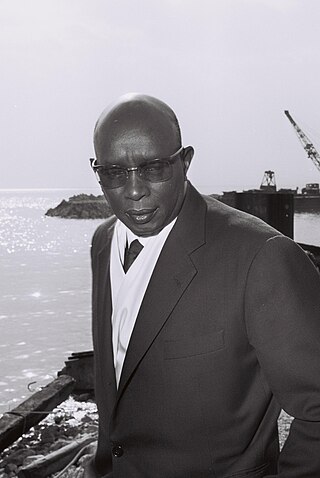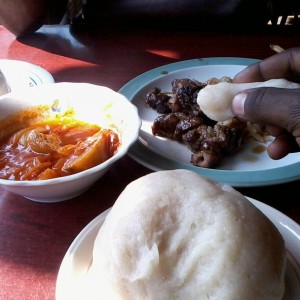Related Research Articles

Bujumbura, formerly Usumbura, is the economic capital, largest city and main port of Burundi. It ships most of the country's chief export, coffee, as well as cotton and tin ore. Bujumbura was formerly the country's political capital. In late December 2018, Burundian president Pierre Nkurunziza announced that he would follow through on a 2007 promise to return Gitega its former political capital status, with Bujumbura remaining as economical capital and center of commerce. A vote in the Parliament of Burundi made the change official on 16 January 2019, with all branches of government expected to move to Gitega within three years.
The Tutsi, also called Watusi, Watutsi or Abatutsi, are an ethnic group of the African Great Lakes region. They are a Bantu-speaking ethnic group and the second largest of three main ethnic groups in Rwanda and Burundi.

The coat of arms of Burundi, adopted in 1966, consists of a shield surrounded by three spears. On the shield is the motto of the nation, as well as the head of a lion. Behind the shield there are three crossed traditional African spears. Under the shield the national motto of Burundi appears on a scroll: Unité, Travail, Progrès.

Mwambutsa IV Bangiricenge was the penultimate king (mwami) of Burundi who ruled between 1915 and 1966. He succeeded to the throne on the death of his father Mutaga IV Mbikije. Born while Burundi was under German colonial rule, Mwambutsa's reign mostly coincided with Belgian colonial rule (1916–62). The Belgians retained the monarchs of both Rwanda and Burundi under the policy of indirect rule.
Ntare II Rutaganzwa Rugamba was the king of Burundi. He was the son of king Mwambutsa I Mbariza and Msabiyije, a wife from the influential Bashoka Tutsi clan. The early years of his reign began with a regency, which was common in Burundian royal history.
Mwami Mutaga III Senyamwiza Mutamo was the king of Burundi. He ascended to the throne c.1735-1739 and ruled until his death in 1767. He succeeded king Mwezi III Ndagushimiye.
Ntare I Kivimira Savuyimba Semunganzashamba Rushatsi Cambarantama was the king of Burundi from 1675 to 1709. He was a legendary descendant of the Ntwero family, and the first king of Burundi. His mother's name was Inanjonaki.

Ruanda-Urundi, later Rwanda-Burundi, was a colonial territory, once part of German East Africa, that was occupied by troops from the Belgian Congo during the East African campaign in World War I and was administered by Belgium under military occupation from 1916 to 1922. It was subsequently awarded to Belgium as a Class-B Mandate under the League of Nations in 1922 and became a Trust Territory of the United Nations in the aftermath of World War II and the dissolution of the League. In 1962 Ruanda-Urundi became the two independent states of Rwanda and Burundi.

The Football Federation of Burundi is the governing body of football in Burundi. It was founded in 1962, affiliated to FIFA in 1972 and to CAF in 1972. It organizes the national football league and the national team.

Burundi first participated at the 1996 Olympic Games, and has sent athletes to compete in every Summer Olympic Games since then. The nation has never participated in the Winter Olympic Games.

Burundi, officially the Republic of Burundi, is a landlocked country in the Great Rift Valley at the junction between the African Great Lakes region and Southeast Africa. It is bordered by Rwanda to the north, Tanzania to the east and southeast, and the Democratic Republic of the Congo to the west; Lake Tanganyika lies along its southwestern border. The capital city is Gitega and the largest city is Bujumbura.
These are some of the articles related to Burundi on the English Wikipedia:

Diplomatic relations between the People's Republic of China and the Republic of Burundi were established on December 21, 1963, under Chairman Mao Zedong and King Mwambutsa IV Bangiriceng, respectively. King Mwambutsa broke off diplomatic relations with China in 1965, although they were restored under Michel Micombero the first President of Burundi, on October 31, 1971. Since then, China has provided development aid to Burundi, including helping with the construction of a textiles mill in Bujumbura. As of 2002, China exported $2.718 worth of goods, while importing only $491,000 worth of goods from Burundi. The current Chinese ambassador to Burundi is Feng Zhijun.

Burundi is situated in East Africa and has a territory full of mountains, savannas and agricultural fields, with forests in the surrounding rivers and waters. Agriculture is spread on 80% of the country's surface and it mainly includes coffee, tea, maize, beans and manioc. Due to these characteristics, Burundi cuisine is very representative of the African culinary culture, as it includes beans, which are the staple of Burundi cooking, exotic fruits, plantains, sweet potatoes, cassava, peas, maize and cereals, like corn and wheat.
Cédric Amissi is a Burundian footballer who plays as a midfielder for the Burundi national team. He played for Burundi internationals in the 2014 and 2018 FIFA World Cup qualifiers.

On 28 November 1966, Michel Micombero, Burundi's 26-year-old Prime Minister, ousted the 19-year-old king (mwami) of Burundi, Ntare V, in a coup d'état. Ntare was out of the country at the time and the coup leaders quickly succeeded in taking control. Micombero declared an end to the monarchy and the Kingdom of Burundi became a republic, with Micombero as its first President.

On 8 July 1966, a coup d'état took place in the Kingdom of Burundi. The second in Burundi's post-independence history, the coup ousted the government loyal to the king (mwami) of Burundi, Mwambutsa IV, who had gone into exile in October 1965 after the failure of an earlier coup d'état.
The Burundi Billie Jean King Cup team represents Burundi in Billie Jean King Cup tennis competition and are governed by the Fédération de Tennis du Burundi. They currently compete in the Europe/Africa Zone of Group III.
References
- ↑ Eggers, Ellen K. (2006). Historical Dictionary of Burundi. Scarecrow Press. p. 167. ISBN 978-0-8108-5302-7.
